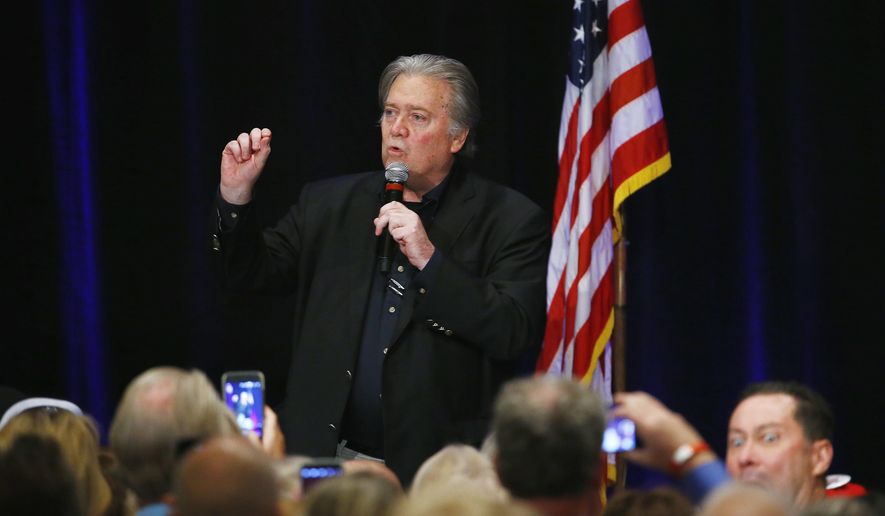LOS ANGELES (AP) — Former White House adviser Steve Bannon wants to oust Republican senators he feels are disloyal to President Donald Trump. But when he comes to Southern California on Friday, he’ll be in a state Trump lost by over 4 million votes and where Republicans have become largely irrelevant in state politics.
There wasn’t even a Republican on the ballot in last November’s U.S. Senate runoff - it was two Democrats. And in Orange County, where Bannon will be speaking, several Republican House members are trying to hold onto their seats in districts carried by Hillary Clinton in the 2016 presidential contest.
Bannon is scheduled to deliver a keynote speech at a state Republican convention in Anaheim, just days after leveling a blistering attack on Senate Majority Leader Mitch McConnell and other top Republicans at an Arizona fundraiser.
Protesters plan to gather outside the hotel where Bannon will speak. He’s called for an “open revolt” against establishment Republicans, and is promoting a field of primary challengers to take on incumbent Republicans in Congress.
But in California, the GOP has been fading for years.
The state has become a kind of Republican mausoleum: GOP supporters can relive the glory days by visiting the stately presidential libraries of Ronald Reagan and Richard Nixon, but today Democrats control every statewide office and rule both chambers of the Legislature by commanding margins.
With the GOP relegated to the bleachers in Sacramento, Bannon’s message is likely to receive a warm response from the conservative activists who tend to dominate at the GOP conclave.
“Steve Bannon is a natural fit for a party that is hungry for a revolution, and the party in California is definitely hungry for a revolution,” former Orange County Republican leader Scott Baugh said.
Not all Republicans are glad to see Bannon. In a series of tweets last week, former state Assembly Republican leader Chad Mayes said he was shocked by the decision to have the conservative firebrand headline the event.
“It’s a huge step backward and demonstrates that the party remains tone deaf,” Mayes tweeted.
California Republicans have bickered for years over what direction to turn - toward the political center or to the right.
Most of the state’s governors in the 20th century were Republicans, and state voters helped elevate a string of GOP presidential candidates to the White House. But the party’s fortunes started to erode in the late 1990s after a series of measures targeting immigrants, which alienated growing segments of the state’s population.
In 2007, then-Gov. Arnold Schwarzenegger warned party members that the GOP was “dying at the box office” and needed to move to the political center and embrace issues like climate change to appeal to a broader range of voters. In 2011, a state Republican Party committee blocked an attempt by moderates to push the state GOP platform toward the center on immigration, abortion, guns and gay rights.
The decline continued. Republicans are now a minor party in many California congressional districts, outnumbered by Democrats and independents. Statewide, Democrats count 3.7 million more voters than the GOP.
U.S. Rep. Darrell Issa is among four GOP House members whose districts fall partly or completely within Orange County, once a Republican stronghold in Southern California but increasingly Democratic. All four are seen as targets as Democrats seek to regain a House majority.




Please read our comment policy before commenting.